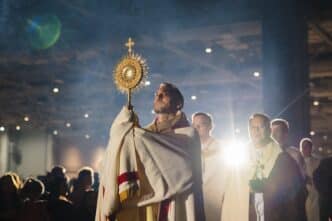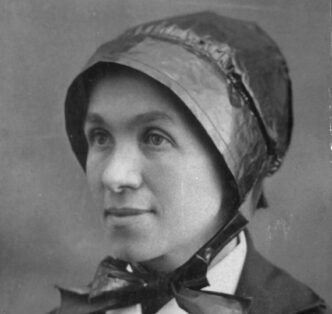MADRID (OSV News) — The president of the Spanish bishops’ conference, Archbishop Luis Argüello of Valladolid, reacted to Spanish public television’s New Year’s program in which a host mocked an image of the Sacred Heart of Jesus.
In a Jan. 1 post on X, Archbishop Argüello said, “It saddens me that with the alibi of freedom of expression … TVE makes a mockery of the symbol of the Heart so dear to all Catholics,” adding that “the saddest thing is that those responsible are not aware of what they are doing. Once again, banality surrounds us.”
The prelate reacted to the alleged joke of the comedian who hosted the countdown of the New Year on TVE — Laura Yustres Vélez, known as “Lalachús” — that showed an image of the Sacred Heart, but instead of the head of Jesus, a bull’s head was seen. The bull is well known to Spaniards from the “El Gran Prix” entertainment show.
The next day the archbishop asked, however, that no one answer an insult by even more insults. “It is not a good defense of the symbol of merciful Love to insult people whom the Heart of Jesus also loves and forgives their offenses,” he said in a Jan. 2 X post.
“It is possible to unite truth and charity. The wounded symbol and the pain it experiences must become a witness to the new love it represents,” Archbishop Argüello said.
The current president of TVE, José Pablo López, served as general director of TRECE, the television channel of the Spanish bishops’ conference, Alfa y Omega, a Spanish Catholic magazine, reported. He has yet to respond to the scandal.
A line that “must not be crossed”
In a conversation with Alfa y Omega, Rafa Vázquez, director of the Spanish bishops’ conference’s secretariat of the subcommission for interfaith relations, commented that what happened is one of “the red lines that must not be crossed when we want to live in mutual respect.”
The New Year’s Eve program was co-hosted by David Broncano, who is host of the “La Revuelta” TV program along with Yustres.
“Spanish Television bid farewell to the year with a mockery of the Sacred Heart of Jesus by the presenters,” Archbishop José Ángel Saiz Meneses of Seville said in his X post on Jan. 1.
He said he was reminded of Cicero’s famous phrase, in Latin: “Quo usque tandem abutere, Catilina, patientia nostra?” (“When, O Catiline, do you mean to cease abusing our patience?”) — which, the archbishop said, “when applied to current affairs, leads us to wonder how long they will take advantage of our patience.”
The controversy closed a year in which the Spanish government announced its intention to remove the crime of offending religious feelings from the Penal Code as part of a plan for “democratic regeneration.”
The measure was announced in the same week in which the Interfaith Dialogue Roundtable of Spain was established, created to “work to ensure the proper exercise of the fundamental right to religious freedom of believers.”
The ‘crime’ of offending religious freedom
In fact, in its first public statement, the roundtable warned that the repeal would “substantially violate the right to religious freedom” and expressed “serious concern” at the intention to eliminate the crime of offending religious freedom, which “has been justified as a way of giving greater protection to freedom of expression.”
Vázquez, who is also secretary of the Interfaith Dialogue Roundtable, said that what happened in a TV program “is nothing more than a praxis of what could be the elimination of the crime against religious feelings,” adding he learned about the incident “with great sadness.”
In a conversation with Alfa y Omega, Vázquez said that “when we issued the first statement we were offering a helping hand to dialogue in order to deal with these issues,” but “it is clear that there is no intention of dialogue or respect for religious feelings.”
In his answer to the television program, Félix Bolaños, socialist minister of the Presidency, Justice and Relations with Parliament, said on X that the government will not refrain from reform, saying that “In 2025 we will push for the reform of the crime of religious offenses to guarantee freedom of expression and creation, a measure of the Action Plan for Democracy.”
Vázquez said that the dissemination of the blasphemous image not only offended the religious feelings of Catholics, “but also of evangelicals and Orthodox.” Even “Muslims and Jews feel offended, and do not understand how these limits of offense and disrespect can be crossed. For them, Jesus is one of their great prophets,” he said.







